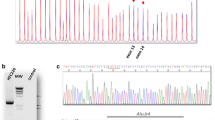Abstract
Incidence of colorectal cancer (CRC) is lower in India than in other parts of the world. Approximately 5% to 10% of CRC is inherited. Hereditary non-polyposis colorectal cancer (HNPCC) syndrome and familial adenomatous polyposis (FAP) syndrome are the two known familial cancer syndromes of gastrointestinal tract, which occur due to inherited genetic predisposition. Not much is known about the molecular profile of families with inherited CRC syndromes seen in Indian population. At our institute, we have been providing genetic testing and counseling service to all the families referred to us with suspicion of inherited cancer predisposition syndrome. We analyzed 36 suspected families at our clinic. Personal and family history of cancer was obtained from the proband and appropriate genetic testing was performed in 19 patients (13 with HNPCC, 5 with FAP, and 1 with Cowden syndrome). We present here our experience and spectrum of pathogenic variants observed in this patient cohort and review on published studies describing molecular profile of Indian patients with CRC syndromes.

Similar content being viewed by others
References
“Fact Sheets by Population-CRC India ASRs.” [Online]. Available: http://globocan.iarc.fr/Pages/fact_sheets_population.aspx. Accessed 5 Aug 2018.
Patil PS, Saklani A, Gambhire P, et al. Colorectal cancer in India: an audit from a tertiary center in a low prevalence area. Indian J Surg Oncol. 2017;8:484–90.
Pal M. Proportionate increase in incidence of colorectal cancer at an age below 40 years: an observation. J Cancer Res Ther. 2006;2:97–9.
Maharaj R, Shukla PJ, Sakpal SV, et al. The impact of hereditary colorectal cancer on the Indian population. Indian J Cancer. 2014;51:538–41.
Patel SG, Ahnen DJ. Familial colon cancer syndromes: an update of a rapidly evolving field. Curr Gastroenterol Rep. 2012;14:428–38.
Umar A, Boland CR, Terdiman JP, et al. Revised Bethesda Guidelines for hereditary nonpolyposis colorectal cancer (Lynch syndrome) and microsatellite instability. J Natl Cancer Inst. 2004;96:261–8.
Vasen HF, Watson P, Mecklin JP, Lynch HT. New clinical criteria for hereditary nonpolyposis colorectal cancer (HNPCC, Lynch syndrome) proposed by the International Collaborative Group on HNPCC. Gastroenterology. 1999;116:1453–6.
Ishimura N, Yamasawa K, Karim Rumi MA, et al. BRAF and K-ras gene mutations in human pancreatic cancers. Cancer Lett. 2003;199:169–73.
Hegde MR, Roa BB. Genetic testing for hereditary nonpolyposis colorectal cancer (HNPCC). Curr Protoc Hum Genet. 2009;Chapter 10:Unit 10.12. https://doi.org/10.1002/0471142905.hg1012s61.
Torrezan GT, da Silva FC, Santos EM, et al. Mutational spectrum of the APC and MUTYH genes and genotype-phenotype correlations in Brazilian FAP, AFAP, and MAP patients. Orphanet J Rare Dis. 2013;8:54.
Richards S, Aziz N, Bale S, et al. ACMG Laboratory Quality Assurance Committee. Standards and guidelines for the interpretation of sequence variants: a joint consensus recommendation of the American College of Medical Genetics and Genomics and the Association for Molecular Pathology. Genet Med. 2015;17:405–24.
Adzhubei IA, Schmidt S, Peshkin L, et al. A method and server for predicting damaging missense mutations. Nat Methods. 2010;7:248–9.
Schwarz JM, Cooper DN, Schuelke M, Seelow D. MutationTaster2: mutation prediction for the deep-sequencing age. Nat Methods. 2014;11:361–36.
Borràs E, Pineda M, Brieger A, et al. Comprehensive functional assessment of MLH1 variants of unknown significance. Hum Mutat. 2012;33:1576–88.
Takahashi M, Shimodaira H, Andreutti-Zaugg C, et al. Functional analysis of human MLH1 variants using yeast and in vitro mismatch repair assays. Cancer Res. 2007;67:4595–604.
Loconte DC, Patruno M, Lastella P, et al. A rare MSH2 mutation causes defective binding to hMSH6, normal hMSH2 staining, and loss of hMSH6 at advanced cancer stage. Hum Pathol. 2014;45:2162–7.
Bashyam MD, Kotapalli V, Raman R, et al. Evidence for presence of mismatch repair gene expression positive Lynch syndrome cases in India. Mol Carcinog. 2015;54:1807–14.
Rajkumar T, Soumittra N, Pandey D, et al. Mutation analysis of hMSH2 and hMLH1 in colorectal cancer patients in India. Genet Test. 2004;8:157–62.
Khan N, Lipsa A, Arunachal G, et al. Novel mutations and phenotypic associations identified through APC, MUTYH, NTHL1, POLD1, POLE gene analysis in Indian familial adenomatous polyposis cohort. Sci Rep. 2017;7:2214.
Rajender S, Pooja S, Kumar MV, et al. R659X mutation in the MLH1 gene in hereditary non-polyposis colorectal cancer (HNPCC) in an Indian extended family. Indian J Med Res. 2010;131:64–70.
Ponti G, Castellsagué E, Ruini C, et al. Mismatch repair genes founder mutations and cancer susceptibility in Lynch syndrome. Clin Genet. 2015;87:507–16.
Acknowledgments
The authors wish to acknowledge the contribution of our colleagues at Institute of Medical Genetics and Genomics and other lab mates, and colleagues from other institutions for referring cases to us. Our sincere thanks to all the patients and their families for their kind support.
Author information
Authors and Affiliations
Corresponding author
Ethics declarations
Conflict of interest
PB, SK, RDP, SBM, RS, and ICV declare that they have no conflict of interest.
Ethics statement
The study was performed conforming to the Helsinki declaration of 1975, as revised in 2000 and 2008 concerning human and animal rights, and the authors followed the policy concerning informed consent as shown on Springer.com. No ethical clearance was required in the study as the molecular tests were carried after obtaining informed consent out as per standard of care for diagnostic purpose.
Informed consent
Informed consents were obtained from all families for the genetic tests.
Disclaimer
The authors are solely responsible for the data and the contents of the paper. In no way, the Honorary Editor-in-Chief, Editorial Board Members, the Indian Society of Gastroenterology, or the printer/publishers are responsible for the results/findings and content of this article.
Additional information
Publisher’s note
Springer Nature remains neutral with regard to jurisdictional claims in published maps and institutional affiliations.
Supplementary Information
ESM 1
(DOCX 846 kb).
Rights and permissions
About this article
Cite this article
Bhai, P., Kulshrestha, S., Puri, R.D. et al. Spectrum of mutations in genes associated with familial colorectal cancer syndrome (MLH1, MSH2, PMS2, MSH6, and APC): A not so common hereditary cancer syndrome in Indian population. Indian J Gastroenterol 39, 599–607 (2020). https://doi.org/10.1007/s12664-020-01096-x
Received:
Accepted:
Published:
Issue Date:
DOI: https://doi.org/10.1007/s12664-020-01096-x




